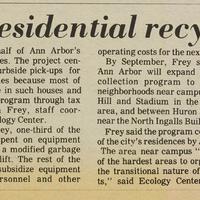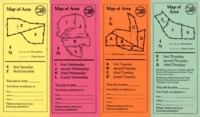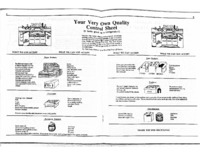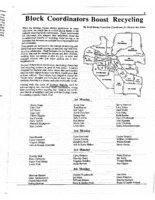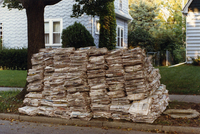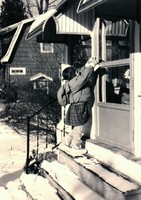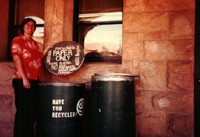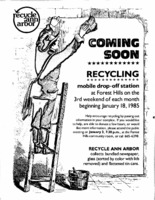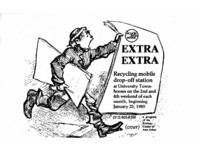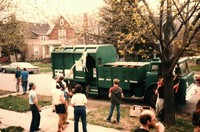Expanding Curbside Recycling
"Recycling can only be effective if individual citizens take the initiative [and] begin using the service." Jim Frey, Ecology Center Staff Coordinator, quoted in the Michigan Daily, June 17 1984.
Block Coordinators Promote Growth
Recycle Ann Arbor experienced rapid growth following its 1982 merger with the Ecology Center. By 1985, RAA had expanded curbside recycling throughout the city, begun accepting six different types of material for processing, and achieved recognition as a cornerstone of the city’s solid waste management program.
RAA owed much of its success in the 1980s to the efforts of block coordinators. These volunteers helped spread the word about curbside recycling and recruited new households to participate in the program. RAA modeled the block coordinator program after “block leaders” from the highly successful Eco-Cycle program in Boulder, Colorado where volunteers collected recyclables from their neighbors and delivered materials to a processing station.
In Ann Arbor, block coordinators served an educational role by teaching residents about the curbside recycling option already in place. Working one or two hours each month, coordinators distributed materials like flyers and door hangers that listed recycling collection information for specific neighborhoods. Some coordinators, like Pat Stejskal, took note of which households did not set out recyclables on collection days and then followed up with them directly to encourage participation. Others, like Kathy Donofrio, convinced her neighbors to become block coordinators while also recruiting about 200 new households into the program.
Personal connections emphasized curbside recycling as a community endeavor. Coordinators also inspired some to become members of the Ecology Center. Bryan Weinert, the RAA Operations Coordinator from 1984-1988, first joined the EC because his wife was a block coordinator.
Wendy Wilson: Block Coordinator
Wendy Wilson, an RAA co-founder, describes herself as the "first block coordinator coordinator." Her role was to organize the block coordinators and equip them to educate their local communities. She describes the crucial information these volunteers conveyed:
"We were really trying to push the idea of source separation as far as it could go, because the more you mix things into the waste stream, you know, the bigger mess you have. We were trying to keep things separated, newspaper from glass bottles, brown bottles from green bottles ... There was a little bit more work for recycling back in the day, and we needed the block coordinators to go around and knock on people's doors, and explain to them how the system would work. And also I had hoped it would help that people would have someone else to call when the pickup day was, or if they actually wanted to volunteer and work on the trucks."
Block coordinators also played an important advocacy role. In 1985, the city's approval of RAA’s $187,000 annual budget had allowed curbside recycling to expand throughout Ann Arbor. To justify and maintain municipal investment, the RAA had to prove its value as a community effort. Block coordinators’ grassroots efforts helped boost participation in recycling programs, which in turn helped RAA and EC leaders lobby for ongoing support from the city.
Community Outreach
While block coordinators focused on residential recycling, RAA leaders also worked with other Ann Arbor constituencies to increase recycling participation. Bryan Weinert, the EC's Operations Coordinator from 1984-1988, was involved in several of these initiatives. During his tenure, RAA grew from serving a tenth of the city to all of Ann Arbor's single-family homes. The majority of Ann Arbor's households, however, occupied multi-family residences. To expend coverage and service to these communities the RAA had to develop new outreach strategies. Reflecting on this period, Weinert noted:
"One of the things I’ve always liked about Recycle Ann Arbor is that it was take charge. It was to do something about it. It was to prove to the city of Ann Arbor that recycling would work, that people would participate, that it matters to do it ... I’ve always appreciated the 'boots-on-the-ground' approach that RAA has taken and has continued throughout its history even to this day in being a demonstration for what it can be, and just doing it. Not just saying it but doing it.”
RAA also responded to requests for curbside recycling expansion from low-income residents. After receiving funding from a Community Development Grant, RAA implemented a mobile recycling station for two multi-family housing units, Forest Hills and University Townhouses. Beginning in January 1985, the program collected 1600 pounds of recyclables from University Townhouses and 475 pounds from Forest Hills within the first two months of its operation.
The university community was also part of an expanded vision for recycling. In 1980, the RAA began a partnership with Campus Recycling, a student volunteer program operating out of the University of Michigan's East Quad residence hall. RAA collected recyclables from East Quad, campus co-ops, and developed a recycling manual for students living in the dorms. Encouraging recycling at U-M was crucial, according to RAA co-founder Jonathan Dreyfuss, because “this university is based on research, and it [the research work] is all just paper.” By extending service to university, low-income, and multi-family housing, the RAA sought to involve the whole community in recycling.
Hands-On Educational Initiatives
In conjunction with block coordinators’ efforts, during the 1980s Ecology Center staff also developed hands-on educational initiatives to promote participation in curbside recycling. Beginning in 1983, the Ecology Center hosted “Recycle Week,” which featured presentations on recycling and hazardous waste. The EC also gave awards to the “Most Wasteful Consumer Product of the Year” and “Most Waste Conscious Business or Institution of the Year.” Wendy Wilson and Nancy Stone also created the Great Neighborhood Trash-Out, a series of lawn demonstrations in Ann Arbor neighborhoods that featured a pile of “garbage” and “no longer garbage.” The goal of these programs was to show residents just how many items could be recycled through curbside recycling.

